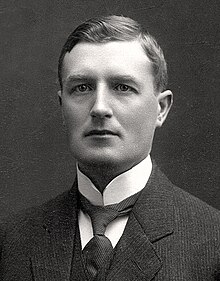
Back ماغنوس اولسن Arabic ماجنوس اولسن ARZ Magnus Olsen Danish Magnus Olsen Spanish Magnús Olsen Icelandic マグヌス・オルセン Japanese Magnus Olsen NN Magnus Olsen NB Magnus Olsen Polish Magnus Olsen Portuguese
Magnus Olsen | |
|---|---|
 | |
| Born | 28 November 1878 Arendal, Norway |
| Died | 16 January 1963 (aged 84) Oslo, Norway |
| Spouse |
Gjertrud Mathilde Kjær
(after 1912) |
| Awards |
|
| Academic background | |
| Alma mater | Royal Frederick University |
| Academic advisors | |
| Academic work | |
| Discipline | Old Norse philology |
| Institutions | Royal Frederick University |
| Notable students | Didrik Arup Seip |
| Main interests | |
| Notable works |
|
| Influenced | |
Magnus Bernhard Olsen (28 November 1878 – 16 January 1963) was a Norwegian philologist who specialized in Old Norse studies.
Born and raised in Arendal, Olsen received his degrees in philology at Royal Frederick University in Kristiania, where he became a protége of Sophus Bugge. After Bugge's death, Olsen succeeded him in 1908 as Professor of Old Norwegian and Icelandic Literature at Royal Frederick University. In this capacity, Olsen taught generations of Norwegian academics and teachers. His field of research centered on runology and Old Norse toponymy. Olsen was particularly interested in using evidence from runes and toponymy for the study of Old Norse religion. Olsen published a number of works on these subjects, which have been highly influential. He also edited a number of works, including the journal Maal og Minne, which he founded.
During the German occupation of Norway in World War II, Olsen served as dean at his university and was involved with the Norwegian resistance movement. In his later years, Olsen's research centered on the Eddas and Skaldic poetry, on which he authored a number of influential works. He is widely considered the foremost Norwegian philologist of his time.